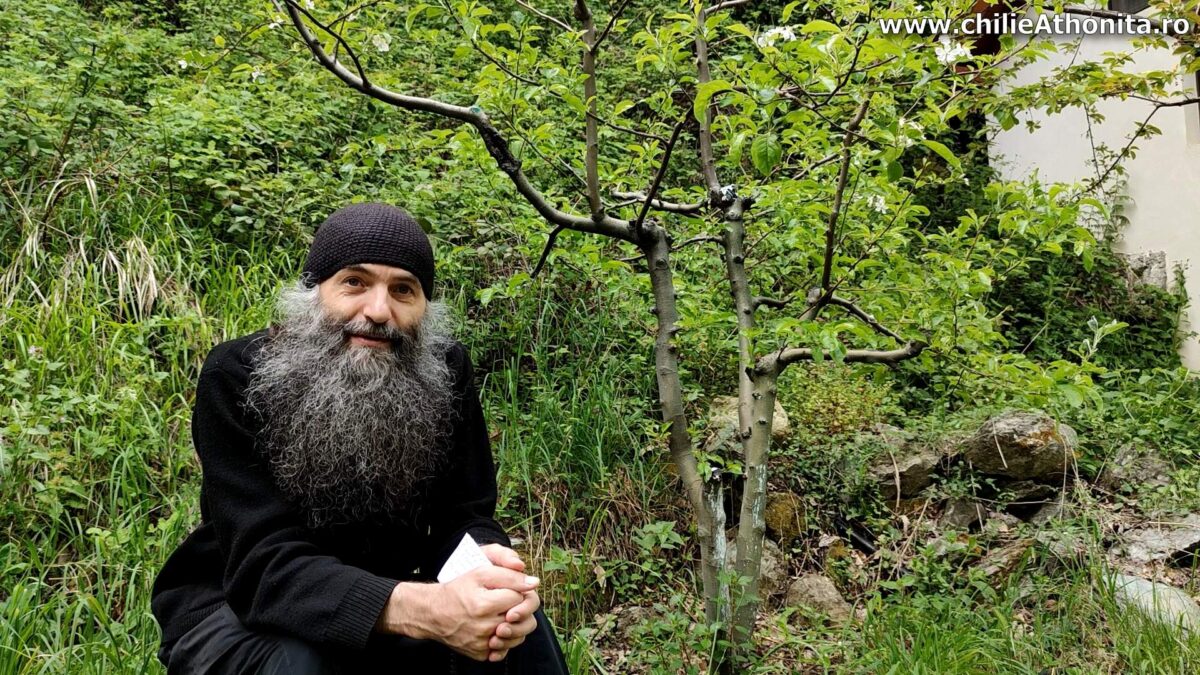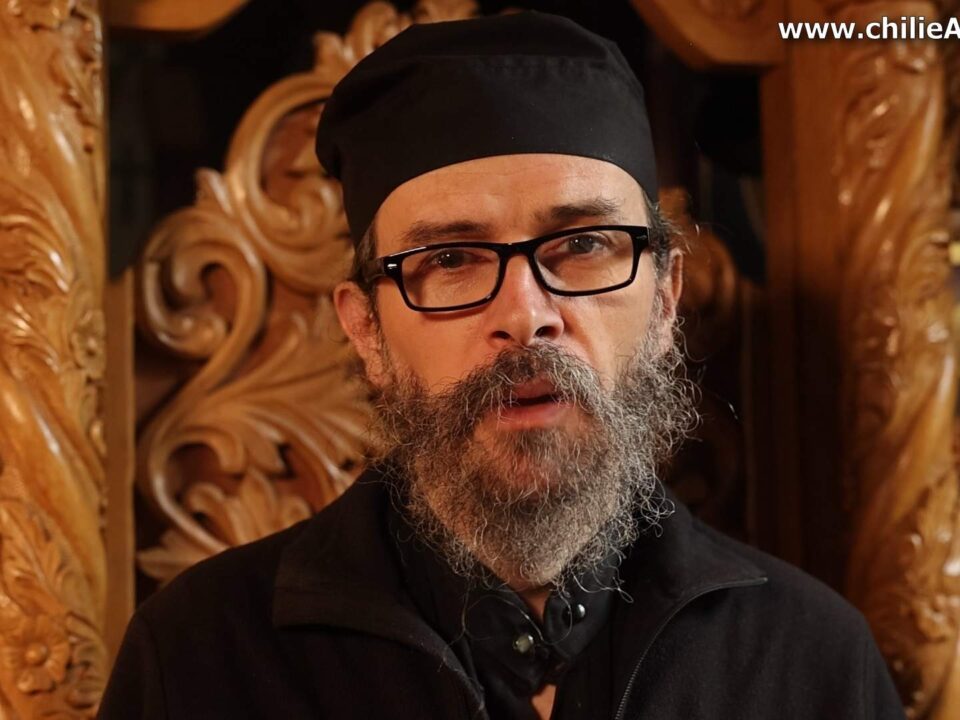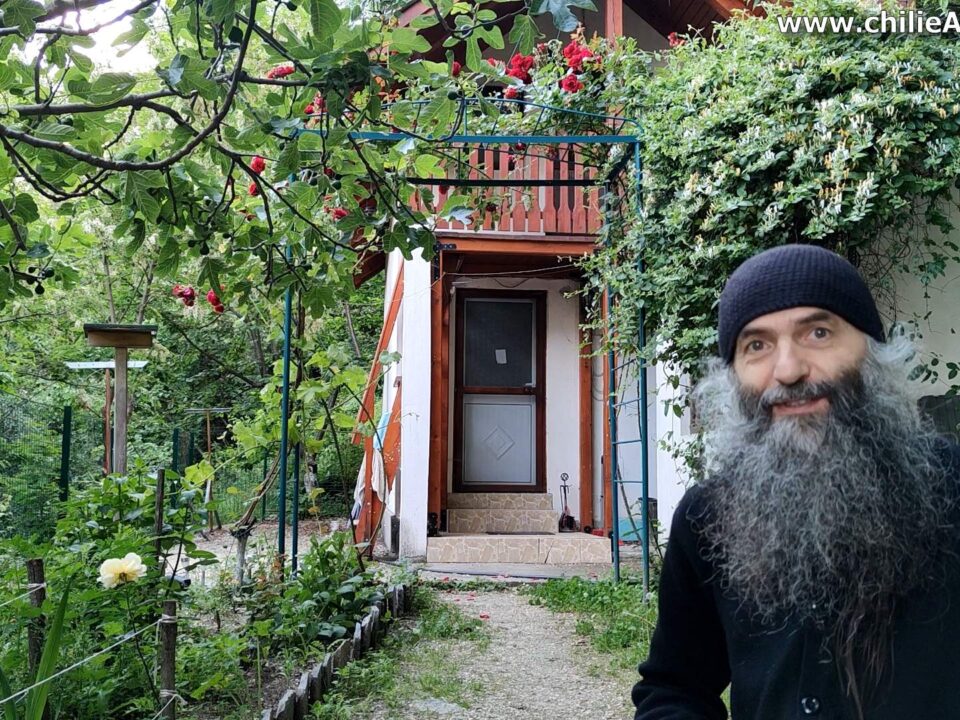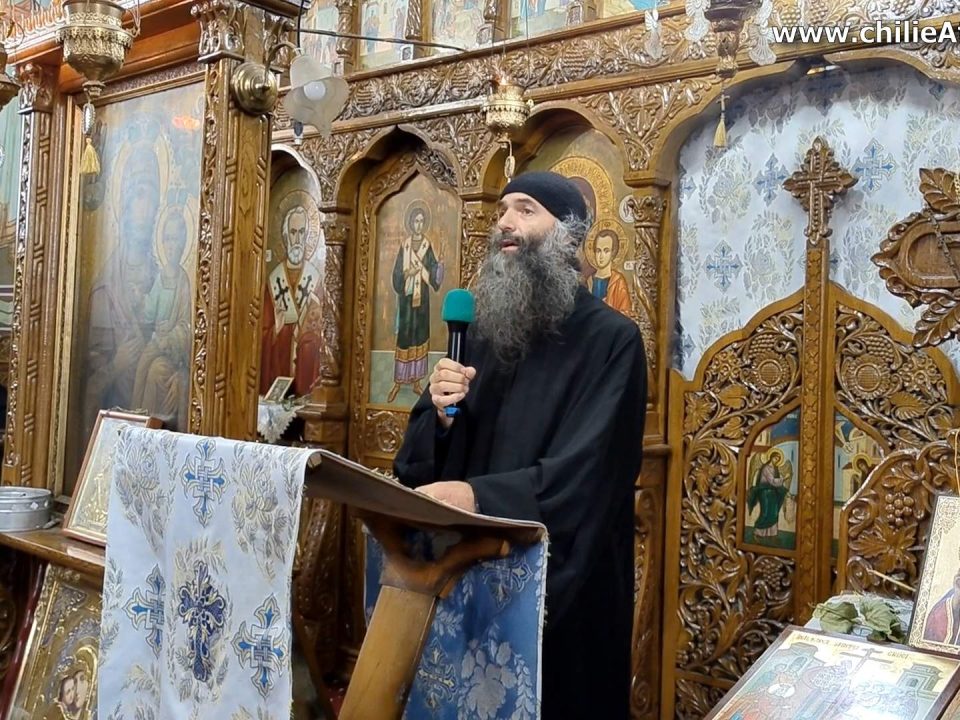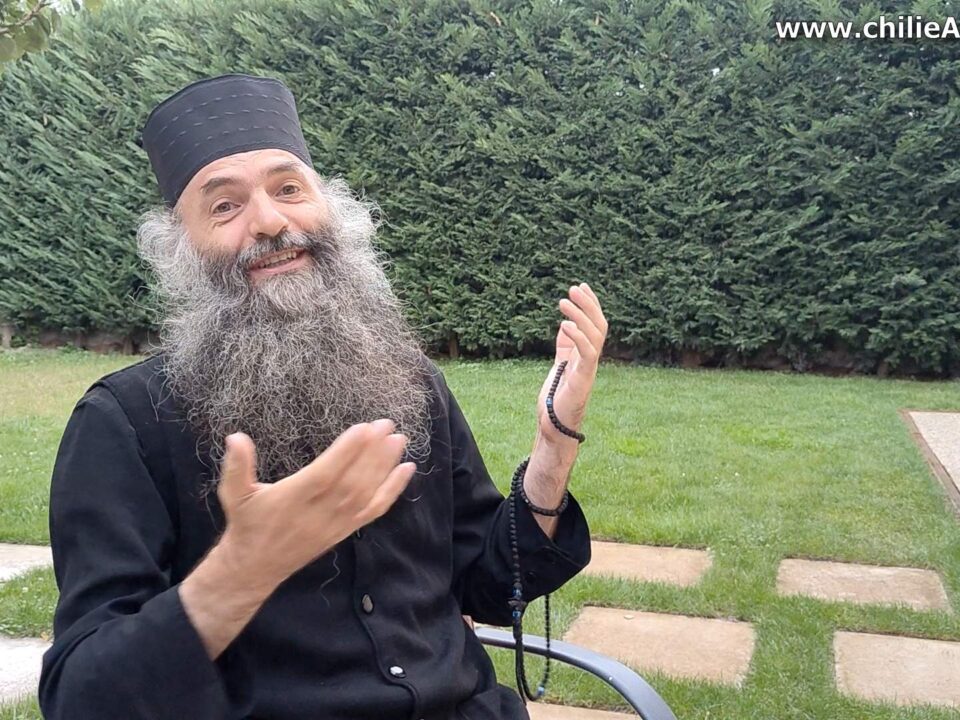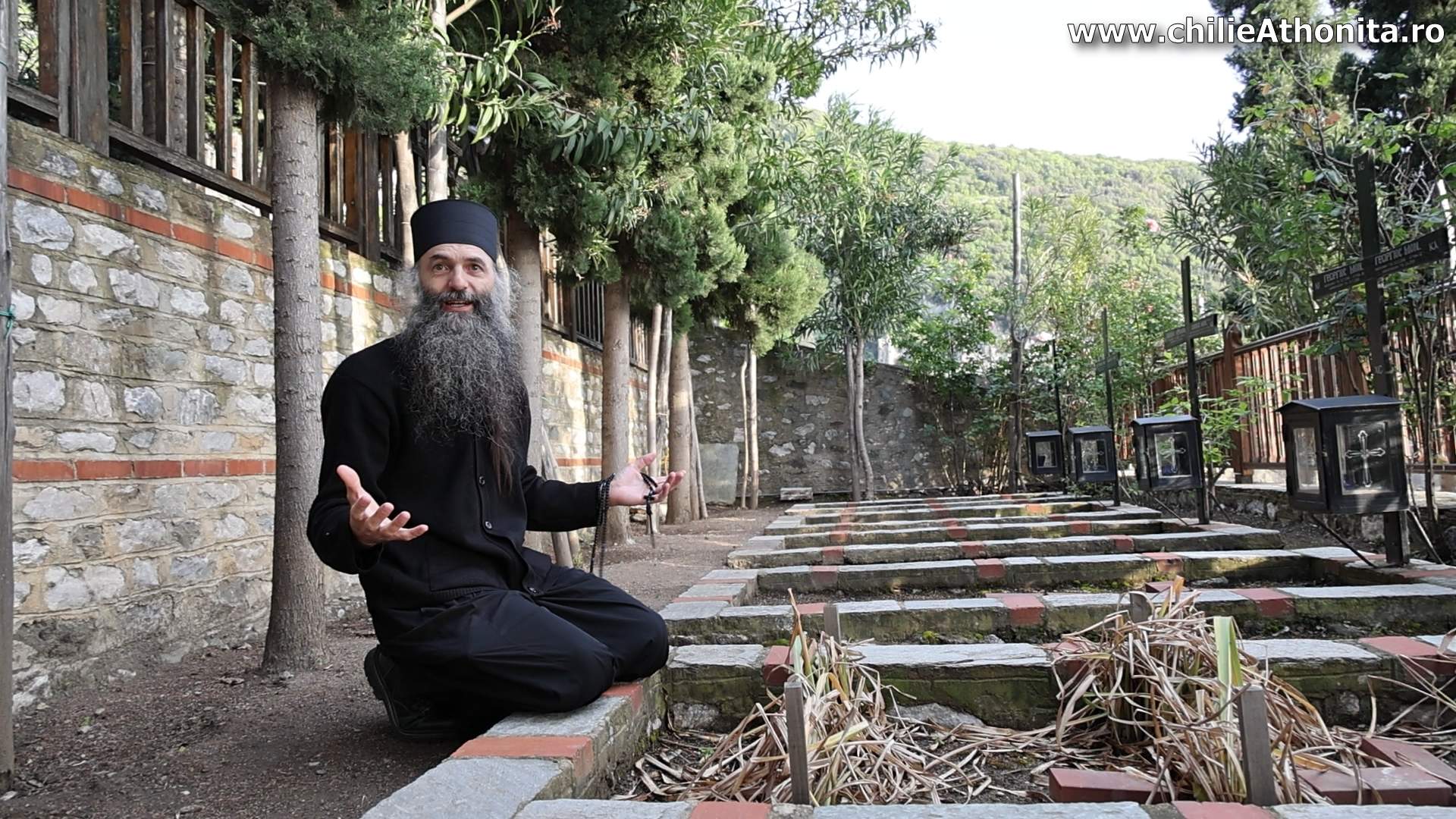
Great Fathers From the Monastery of St. Paul – Father Pimen
11 May 2023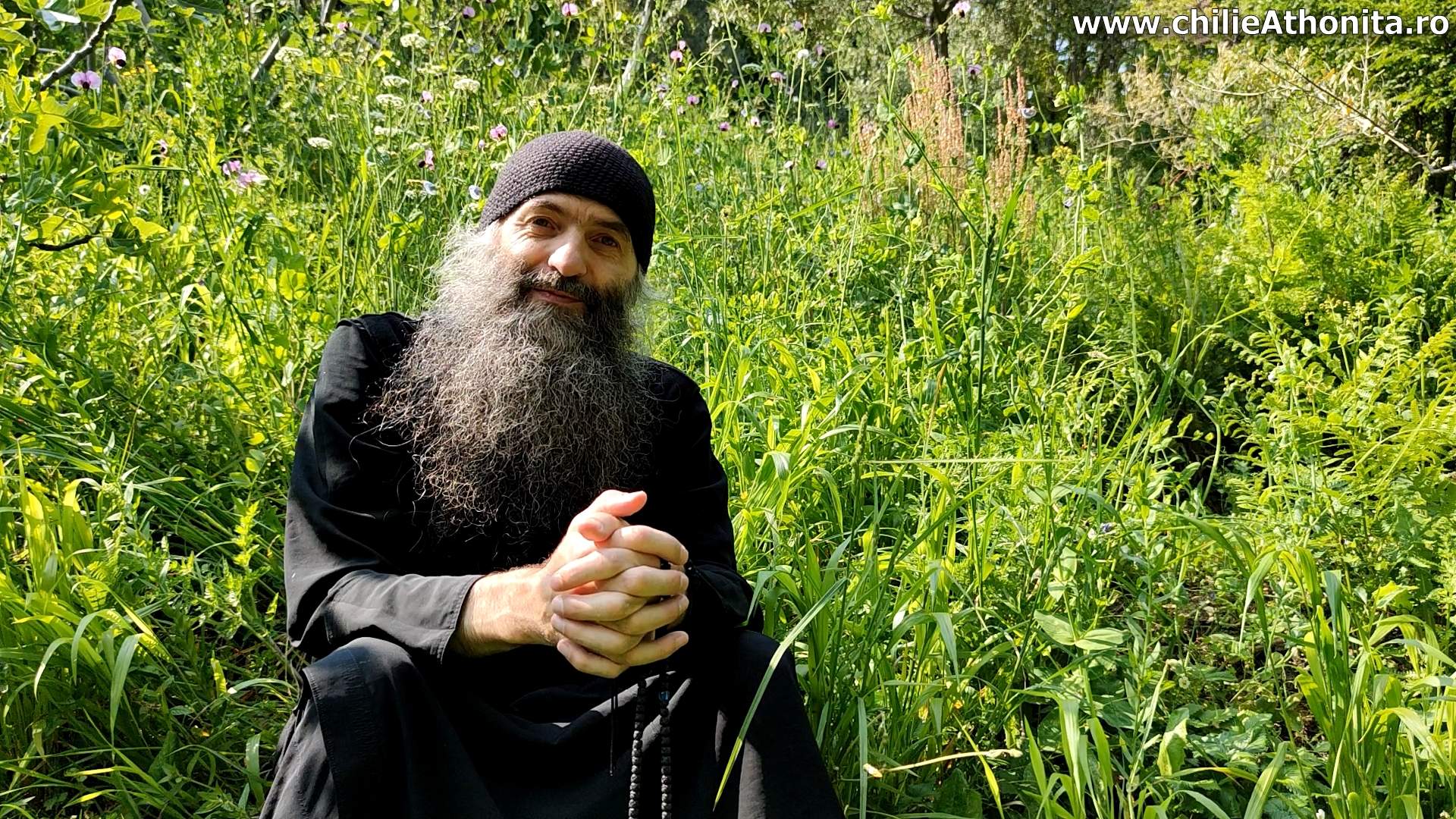
The Ascension of the Lord and Mercy – Fr. Pimen Vlad
25 May 2023Listen to a beautiful reflection by Father Pimen in which he briefly tells us about the life of Saint Nektarios, some miracles the Saint performed, as well as some of the connections he has with Romanians.
Enjoy!
Here we are again, my dear ones! In the noise of spring, in the spring air, the chirping of birds, the whole atmosphere of spring. In our country it’s gotten pretty warm. I retired somewhere in the shade, because it was very hot in the sun. Now the sun is behind the trees.
What else can I tell you? I’ve told you so much. How much longer I’ll be able to talk, I don’t know, because… every day more and more people come and I’ve started to get tired too. I don’t just talk when you see me, one post a week. People come here every day, not just one group, but two, three, five groups a day, maybe even ten a day, and they all want me to talk to them a little, to tell them something, and at some point you get tired.
We came here, to the Holy Mountain, to find some quiet. We don’t run away from the world, but we try to have time to quiet down. Lately, we try to keep everything according to a schedule, because otherwise we won’t be able to cope with it all, and if I get to that fatigue beyond measure, I won’t be able to do any more filming. Sometimes some people get upset that I don’t have time for them. You know how it is, some see you that you are tired and say: “Look, father can’t do it anymore.” And others come and say: “But how, Father, we come to you and you don’t pay attention to us?!” Yes, my dears! This is not like a reprimand, but I want to say that I have become a bit fatigued. That’s why I am trying to find a balance, I’m going to try to go through the forest, to walk, people will come, they will venerate, those who want to can stay for the service, but I won’t be able to cope with all. You know how it is…
Father Cleopas had a saying: “Talking for an hour, is like digging a cubic meter of earth, that’s the toll it takes on the body.” Do you understand? Let’s move past this. That was a parenthesis.
Today I want to tell you a few things about St. Nektarios, even though he is celebrated in autumn. Why do I want to speak about him? Because many are getting ready to go places, it’s warmer out, they may have some holiday time close to summer, so I want to speak about St. Nektarios, not because it is an opportunity but something of benefit to get to go to the island of Aegina, where his monastery is and where his relics are located.
I will say a few things about St. Nektarios. He was born in 1846, in Silivria, a city in Thrace, into a poor family. He started working and learning at an early age. Wishing to continue his studies, he went to Constantinople, where he studied until he was 20 years old. He went to seminary, did religious studies. From there he went to Chios, as a teacher of religion for children, he loved children. Slowly, slowly his desire for monastic life opened up and he became a monk at a monastery in Chios, called the New Monastery. In the meantime, he also finished his studies in theology, and, being prepared, God ordained for him to be called to Alexandria and to be taken in by Patriarch Sophrony of Alexandria (Egypt).
Slowly, slowly, he was ordained deacon, priest and then bishop, being appointed metropolitan of Pentapolis, that is, over “five cities.” At the same time, he was also secretary at the patriarchate. Being humble, he helped everyone and did a lot of good, everything he could do that was in his power, he did, especially since there was great poverty in that area.
But the devil doesn’t sleep when you take this path and want to do good. The envy of those who worked at the patriarchate began to rise up. Since he was more and more appreciated and loved by the people, by the poor, and by all, those in whom envy began gnawing, seeing that he had so much influence, were fearing that he might get a high function, maybe even patriarch. So they went to the patriarch, with seemingly a good thought and began to tell him that Nektarios coveted his throne and that he could hardly wait for him to die or to take his seat. Saying this everyday, they got this idea in the patriarch’s head that Nektarios wanted to take his place imminently.
Perhaps with the involvement of the devil, this pushed on the patriarch’s weak spot, “How can this be possible of Nektarios whom I have raised? I never want to see him again if this is what he does!” So they [the envious ones] all got together and made up a document for the patriarch to sign by which they would get rid of him. They convinced the patriarch to sign. When they presented it to St. Nektarios, saying that he had to depart from Egypt urgently and that he is not welcome there, he tried to reach the patriarch, but he was prevented by those who had plotted against him. They didn’t even tell the patriarch that St. Nektarios wanted to come to him. They even came forward and said that the patriarch cannot receive him and to leave according to the command.
And he never even got the chance to see the patriarch. In this way, he was driven out of there. Of course, he returned to Athens. Those from Alexandria, because they didn’t want to the truth to be found out, wrote letters towards the Church of Athens accusing him of all kinds of ugly things so that he would not be welcomed and then become who knows what [high ranking]. When he got to Athens he discovered that he “had a lot of things tied to his tail.” All were looking at him like, “We don’t need you. You’re on your own. We know what you have done.”
In vain he tried to clear his name, no one listened to him. He tried everywhere… With difficulty through the Ministry of Religious Affairs he got permission to work here and there a little bit with children, in a school, but mostly without money. Thus living in abject poverty, he had nothing to eat, he only had the clothes on his back and still he was being persecuted from all sides. After a long time, he was proposed, among other things, also from the Ministry of Religious Affairs, a position in Aegina, where there was a church in a poor state where nobody wanted to go and they had nobody to send. In this way, he was sent as far away from Athens as possible so as not to end up in any great position, because some people around him were envious of his love and kindness. When you take the path of Christ, through love and kindness, the devil raises up your neighbor against you.
Arriving in Aegina, in time he thought of setting up a small monastery, especially since many young girls came who wanted to retire to such a place. He was at a more advanced age now. And he began slowly, slowly. But the devil did not sleep. People said that he had gathered girls to live with, even though he was at an advanced age. Even the mother of a girl, who did not agree with her daughter going to the monastery, went to the higher-ups, she brought the police who beat him, imprisoned him, he went through a lot, just because he was defending his sheep, the few nuns there, who were dedicated to the monastic life and were following him with faith, as their spiritual father who was guiding them.
So he had all against him. And you can imagine, besides being everywhere in the press… it wasn’t like now with the mass-media at this level or it would have been a disaster. But for what was happening at that time, he was defamed all the time. People who didn’t know him, who had only heard about him in the press, defamed him and spat on him. Slowly, slowly, he kept up his work [despite] being persecuted, reviled, beaten, he managed to found his monastery, together with the nuns who had gathered around him. This was how it was all his life: he always did only good, he prayed for everyone, even for those who did evil until it was time for him to go to the Lord. After he went to the Lord – but even during his lifetime, he worked miracles. There was a draught in Aegina and he went out with prayer, with holy water, and God gave rain.
Then the time came and he went to Lord. Tired, slandered as he was, they buried him. After that, things calmed down somewhat because he was no more, nor those who envied him, some of them had also died. After 20 years, they thought of digging him up – because here, in Greece, this is the custom (even in Athos, after 7 years, after 20) – and they found the whole body, incorrupt and with a fragrance. Many still thought of him as the one who did this and that and they buried him again. Later they dug him up again and again they found his body whole, and they buried him again. The third time, the Holy Lord ordained for them to find, as with any departed person, just the bones. The nuns prayed and wondered why the body did not remain whole, and he showed himself to someone later and he said that God allowed this so that his relics can be shared with as many people, in as much of the world. That is what God allowed.
Shortly after falling asleep, the Saint began to perform miracles at his tomb, healings, so that they began to be frightened, especially among those who did not see him well, who had persecuted him. Those who were still alive, saw that they had in fact persecuted a Saint. On November 8, 1920 he passed away and, in 1961, he was canonized. He was among the saints – the one who was defamed and persecuted – as a great miracle worker of our times. People began to come from all over to ask for his help, to be healed. And so, that lousy island, the poorest, those who have been know what it is like now, there is tourism, everything, thanks to St. Nektarios, who took it under his protection.
I remember one thing from the time when abbot Andrew was at St. Paul’s [Monastery], who, during that time when Saint Nektarios passed away, had heard the defamations and had even believed part of them, finding out that Nektarios had been canonized, said that he could not accept him as saint and honor him. One night, the Saint appeared to him in the light, in Glory, and asked him: “Father Andrew, why don’t you think I am a saint? It was not I who sanctified myself, but God did.” And after smiling at him, he disappeared.
When the abbot woke up, he realized his mistake. He gathered the fathers and said that from then on, on the Saint’s day, a vigil would be held, like a small feast day for a patron saint, and we will build a chapel in honor of the Saint. And so a small church was built at St. Paul’s, in honor of St. Nektarios. Do you see how the Saint rebuked him with love, to make him understand that they were all defamations?! He really had a holy life!
Even more recently, I remember a man, a Greek, who had a rather serious cancer. The doctors he had gone to sent him to a hospital in France, with good doctors, maybe there he would still have a chance. The man went by plane, he was still on his feet, and from the airport he used a taxi driver, an old man with a beard, who on the way asked him,
“Where are you going?”
“I am going to that hospital.”
“Why are you going there?”
“Well, I have cancer and I heard, someone told me, that the best doctors are there.”
“But why are you coming here when you have the best hospital in the world?”
“We, Greeks? Where do we have it?”
“On the island of Aegina, and not only [the best for treating] cancer but also for other illnesses.”
“But I have not heard such a thing!”
They kept talking and they got to the hospital, he was dropped off there, after more tests, the man was not given any chance [of healing]. He came back, dejected, and a friend asks him,
“How was it?”
“I didn’t solve anything. I am still gravely ill, terminal stage. But listen to what a taxi driver told me… do you know something about Aegina having the best hospital for treating cancer and other illnesses?”
“Well I have not heard of such a thing, I know there is a poor island hospital there. I haven’t heard of such a thing but I know the monastery of St. Nektarios is there, and he does many healings. You should go there.”
The man was not super pious, but he decided to go. When he arrived at the monastery of Saint Nektarios, he looked at the icon of the Saint and he realized all of a sudden: “This was the taxi driver who took me!” So the Saint appeared to him, drove him in the taxi, and called him to his monastery. When he saw that the saint appeared to him, he went to his tomb, prayed and thus was healed. So, indeed, there was the largest cancer hospital, as the Saint called it, where those who had faith were healed. Do you see what Saint Nektarios does?
Last year I also went to Saint Nektarios, because I hadn’t been there for a few years. I went there, I venerated the Saint, I sat quietly. At one point, a Romanian family came to me, they had younger children, and I talked to them for a little while. Among other things, they invited me to eat with them at a restaurant, just across the street, 10 meters from the big church. The restaurant belongs to a Romanian woman named Dorina. I’m sorry that I don’t know the name of the restaurant, it’s named in Greek, but it belongs to a Romanian. It has good food and many Romanians, the majority, go and eat there. Those who go [to Aegina], go there, I really liked it and they served us with love, with everything. Mrs. Dorina. After that, this family said,
“Father, wouldn’t you like to stay a bit longer on the island?
“Well, I haven’t thought to stay longer.”
“Come stay with us, we have a small house rented in a beautiful spot, come stay with us longer.”
“Alright, I will come.” And I stayed for a few days with them on the island. They had been going on vacation there for several years and knew the island from all points of view. I stayed with them and discovered Aegina. I used to go to Saint Nektarios, but I never went anywhere else. I found out that there are several other beautiful monasteries on the island, including Hrisoleontissa, an old and beautiful monastery of the Mother of God. And the island, in general…
For a few days I rejoiced with them and especially with the children, I got along so well, I played with them, and I discovered the beauty of Aegina. Right where they were staying, the owner there had a bigger boat and took us to an island called Moni, close to them, which is uninhabited, and there are all kinds of animals: stags, wild deer, peacocks, and many others. It is a protected area and those who go there have the opportunity to see a wonderful place. And there are many other things on Aegina Island.
I visited with them for a few days at will and I rejoiced. And I realized how much care Saint Nektarios has taken of the island, how beautifully he’s adorned it and how many wonderful things are there! Those who have the opportunity, go and rejoice first of all in Saint Nektarios, in his grace, in his help, and then, if you are hungry, go to Mrs. Dorina. I really rejoiced, she is a decent woman, after that in the rest of the island, go and visit it, you will find wonderful things. Go without haste. Book a place to stay, there are hotels, everything. Those who can afford it, go and rejoice. Come to the Liturgy at St. Nektarios’ as everyday there is Holy Liturgy, and enjoy all the beauty of Aegina and her protector – Saint Nektarios, who is a great miracle worker!
I will add one more thing I remember and then I will end. There is a lot to say about the Saint, many books have been written about him. We have his relics in Romania as well, at Radu Voda, at the monastery in Bucharest, and in many places in Romania.
My youngest sister who has 10 children, when she was pregnant with one of them, a little boy, she had not decided what name to give him and she called me, “Which saint should I pray to so that I may have an easy birth?” I told her, “Pray to St. Nektarios. If you pray to him, the pains will last at most one or two hours and you will give birth.”
She began to read the Akathist of Saint Nektarios, it was late in the evening, she reached the middle of the Akathist and the pains began. Her husband was on the other side of the country, studying theology at the time. He later became a priest. She was alone at home, with the other children, and she called another brother of ours. She said, “Come quickly, because I am going to give birth!” At 11 o’clock at night, he took his wife too, in case she gave birth in the car. They all went quickly to Fălticeni, to the hospital. They went 10 kilometers and my sister said “I’m giving birth!” He was shaking at the wheel. Another minute passed and my sister said, “I have given birth!” Without pain, as they say, she woke up with the newborn baby in her arms. Quickly, they arrived at the hospital, they came with a stretcher, they took her with the child. So she gave birth without realizing it, so to speak, all of a sudden.
Of course, the child was named Nektarios. They didn’t even have to think about it. Since St. Nektarios helped her. I’m not going to say more, but there were several interventions of Saint Nektarios in the life of the child. But you see that Saint Nektarios helps, and he helps, like you saw, those suffering from serious diseases, cancer, but also women who are pregnant, to give birth easily.
Pray to Saint Nektarios, ask for his help, thank him and, when you have the opportunity, go to the island of Aegina. It’s not far away. Since many go to Dubai, to all the places of the world… but make some time, and rejoice! If you want, those who come by plane to Athens, go to Piraeus, to the port, and from there take a boat that takes you to Aegina in an hour. Then you can take a taxi, there might be a bus, it is not far to the monastery. Those who want can bring their car on the island, to have it if you stay there for a longer period of time.
And of course there are other beautiful things: in Thessaloniki there is the Holy Great Martyr Demetrius, the Myroblyte. On the route you find, if you go to Evia, St. John the Russian, St. Iacobos Tsalikis, St. David. Close by, at Almiros, there is Panagia Kato Xenia. I did a couple of interviews from there, two videos, a couple of years ago, where there are also 2-3 Romanian nuns. At Panagia Kato Xenia there is the belt of the Mother of God, two of the Romanian nuns there came to Romania several times with the belt of the Mother of God.
So you have beautiful places to see! I told you this because summer is coming, travel is starting, people are preparing this, and so try to combine the useful with the beautiful, so to speak. You can enjoy the sea of Greece, but also go to the saints, to greet them and ask for their help!
Alright my dear ones? May the Mother of God, Saint Nektarios and all the other saints help us and let’s make them our friends! May God help us!
Online commemoration lists and donations
May the Lord help us!
Online Commemoration Lists and Donations
May the Lord help us!
If you have a bank card and wish to send commemoration lists and donations online using your card, and/or to support our philanthropic activity, including this site, please fill out the form below to make a small donation. The form is secure – we use Stripe for payment processing – a world leader in this field. We do not collect your personal data.
If you do not have a card, or do not wish to use it, visit the webpage for Online Donations and Commemoration Lists.
We will pray for your loved ones! (Please do not include inessential details like wishes, degree of kinship, introductions etc. JUST the name!)
Especially for recurring commemoration lists, we ask that you please keep them to under 20 names long. If you include a member of the family, we add “and for their families.”

Pomelnice online și donații
Doamne ajută!
Dacă aveți un card și doriți să trimiteți pomelnice online și donații folosind cardul dumneavoastră, sau/și să susțineți activitatea noastră filantropică, inclusiv acest site, vă rugăm să introduceți datele necesare mai jos pentru a face o mică donație. Forma este sigură – procesatorul de carduri este Stripe – leader mondial în acest domeniu. Nu colectăm datele dvs. personale.
Dacă nu aveți card sau nu doriți să-l folosiți, accesați Pagina de donații și Pomelnice online .
Ne rugăm pentru cei dragi ai dumneavoastră! (vă rugăm nu introduceți detalii neesențiale precum dorințe, grade de rudenie, introduceri etc. Treceți DOAR numele!)
Mai ales pentru pomelnicele recurente, vă rugăm să păstrați pomelnicele sub 20 de nume. Dacă puneți un membru al familiei, noi adăugăm „și familiile lor”.
Dumnezeu să vă răsplătească dragostea!


